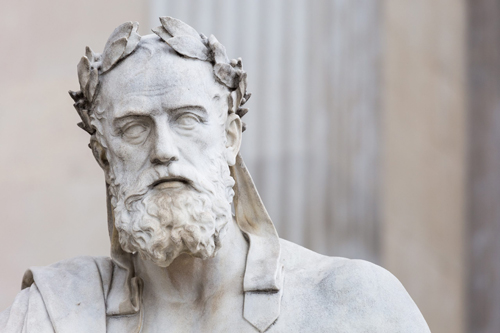
Your complimentary articles
You’ve read one of your four complimentary articles for this month.
You can read four articles free per month. To have complete access to the thousands of philosophy articles on this site, please
Philosophical Haiku
Xenophanes (c.570-c.478 BCE)
by Terence Green
Made in our image.
Just think how gods might appear
If horses could draw.

As far as we know (which is as far as his biographer Diogenes Laërtius knew), Xenophanes was born in Colophon, a small Ionian Greek city-state in what is now western Turkey. Being both philosophically and poetically minded, Xenophanes liked to broaden his mind by travelling. He started travelling when he was about twenty-five, possibly encouraged on his way by the invasion of Ionia by Harpagus the Mede. Travel suited him and his inquiring mind so much that he ‘tossed about the Greek land’, as he put it, for some sixty-seven years, which is to say, until he died.
Early in these travels, he settled comfortably into his self-appointed role as a cultural and theological critic and anthropological observer. One of his preoccupations was the gods, and especially their uncanny likeness to ourselves. Have you ever thought the idea that the gods look just like us is a bit too much of a coincidence? Well, so did Xenophanes. Making fun of his compatriots – and tearing strips off his illustrious poetic forebears, Homer and Hesiod – he gleefully pointed out that all cultures make their gods look like themselves. This anthropomorphism, he said, was just another example of our petty egoism: if animals could draw, they would draw their gods just like themselves.
Not content to lampoon how his compatriots portrayed their gods, he also stuck into them for worshipping gods with such dubious morals: the endless accounts of rape, pillage, adultery, deceit, theft, murder, and incest the Greek gods indulged in were hardly calculated to instil virtue into the hearts of the faithful (even if they did make for ripping good yarns). In place of this, Xenophanes proposed a single god – or, at least, a god above all the others – who was nothing like us: one of unalloyed virtue. This makes him an early proponent of the sort of monotheism that would come to dominate the Western world.
© Terence Green 2024
Terence Green is a writer, historian, and lecturer who lives in Eastbourne, New Zealand.









